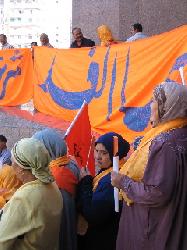Gamal Al Banna is one of Egypt’s most prominent thinkers on Islam, although you wouldn’t think so from the treatment he gets from the “official” Islam of Al Azhar, the oldest Islamic university which is based in Cairo but influences all Sunni Muslims. Al Azhar has decided to ban a new book by Al Banna which continues his calls for a radical re-interpretation of Islamic law. As my friend Paul Schemm
reports in the Christian Science Monitor:
In the now blacklisted book, “The Responsibility for the Failure of the Islamic State,” author Gamal al-Banna suggests ways for Muslim minorities in Europe and elsewhere to integrate into non-Islamic societies. He argues that it would be permissible for women to cover their hair with a hat, rather than a head scarf, and recommends men use an early Islamic tradition of temporary marriages, legal in the Shiite sect, to avoid intercourse outside of wedlock.
. . .
This is not the first time Banna has raised the ire of Al Azhar. Only a few years ago, he published a three volume work entitled “Towards a New Jurisprudence” that called for total reevaluation of Islamic law. He is also the brother of Hassan al-Banna, the founder of the Muslim Brotherhood from which most present day militant Islamic movements take their inspiration. Gamal al-Banna, however, has much more moderate views of the religion than his sibling.
“We must open the doors for the freedom of thought without any restrictions at all,” Banna says. “Even if one wants to deny the existence of God.”
Al Banna, of course, is the brother of Hassan Al Banna, who founded the Muslim Brotherhood in the late 1920s. The Muslim Brotherhood is the first modern Islamist movement, and has been for most of the past hundred years one of the leading political forces in Egypt. Its influence has also extended to elsewhere in the Arab world, from benign Islamist parties such as Jordan’s to more militaristic movements like Hamas in Palestine. Generally, it shuns terrorism, but supports it in Palestine where it sees it as a war of national liberation. The Brotherhood is much further to the right than Gamal Al Banna’s thinking, who is often grouped with a few other reformist thinkers as “leftist Islamists” because of his moderation and emphasis on social issues. In a sense, Al Banna’s precursors were the early Islamic reformers like Jamal Al Din Af Afghani and Muhammad Abdou who were, on the whole, much more moderate than the Muslim Brothers.
One of the tragedies of the political situation in most Arab countries in that these people have had little opportunity to make their voice heard, as they tend to be squeezed out of the political discourse between secular regime parties and organizations like the Muslim Brotherhood, which is on the right -wing of a much broader tendency to look for Islam for political guidance. People like Al Banna, who in the past has felt comfortable supporting both leftist and liberal figures (he is for instance a supporter of Saad Eddin Ibrahim, who is interviewed in the CSM article and is a leading pro-US liberal in Egypt), are being silenced by fundamentalist Islamists, the stale official Islam of Al Azhar theologians and the decaying Arab regimes. This is why providing them a platform in the West — like Tariq Ramadan — is important if their works are to spread.


